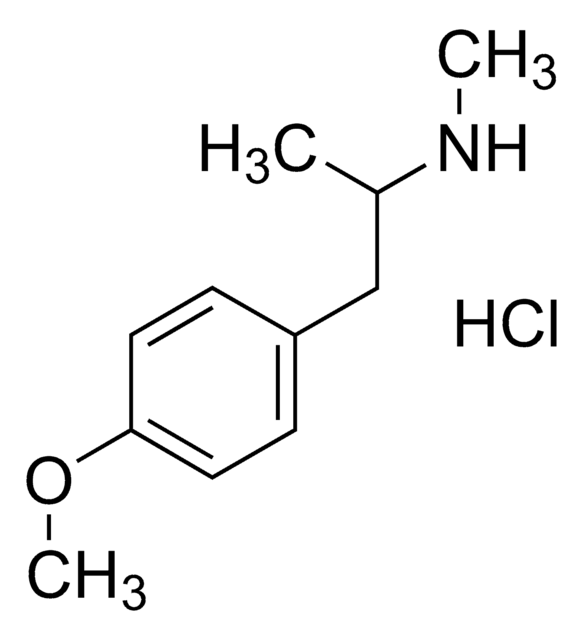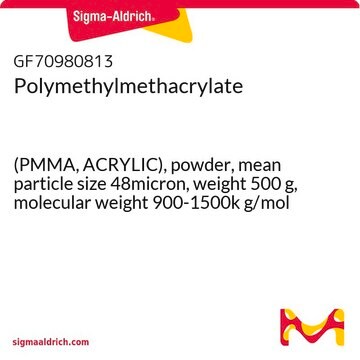81489
Poly(methyl methacrylate)
analytical standard, for GPC, 2,000
Synonym(s):
PMMA, Poly(methacrylic acid methyl ester)
Sign Into View Organizational & Contract Pricing
All Photos(1)
About This Item
Linear Formula:
[CH2C(CH3)(CO2CH3)]n
CAS Number:
MDL number:
UNSPSC Code:
41116107
PubChem Substance ID:
NACRES:
NA.24
Recommended Products
grade
analytical standard
for GPC
Quality Level
autoignition temp.
580 °F
shelf life
limited shelf life, expiry date on the label
mol wt
Mn ~1730
Mp ~1960
Mw ~1900
technique(s)
gel permeation chromatography (GPC): suitable
solubility
H2O: insoluble
density
1.200 g/cm3
Mw/Mn
~1.10
format
neat
storage temp.
2-8°C
InChI
1S/C5H9O2/c1-4(2)5(6)7-3/h1-3H3
InChI key
PMAMJWJDBDSDHV-UHFFFAOYSA-N
Looking for similar products? Visit Product Comparison Guide
General description
Poly(methyl methacrylate) is a rigid and transparent type of polymer material. It is obtained via polymerization of methyl methacrylate monomer.
Storage Class Code
11 - Combustible Solids
WGK
nwg
Personal Protective Equipment
dust mask type N95 (US), Eyeshields, Gloves
Choose from one of the most recent versions:
Already Own This Product?
Find documentation for the products that you have recently purchased in the Document Library.
Customers Also Viewed
Biomechanics and Biomaterials in Orthopedics (2004)
Plastics Materials (1999)
Kariem Mostafa Al Batouty et al.
The journal of adhesive dentistry, 15(2), 161-166 (2013-03-28)
To compare the push-out bond strength of a new glass fiber root canal filling material to that of Resilon/ Epiphany, EndoREZ, and gutta-percha/AH Plus root canal filling materials. Sixty roots were randomly divided into four groups (n = 15) according
S A Bini et al.
The bone & joint journal, 95-B(3), 367-370 (2013-03-02)
We evaluated the impact of pre-coating the tibial component with polymethylmethacrylate (PMMA) on implant survival in a cohort of 16 548 primary NexGen total knee replacements (TKRs) in 14 113 patients. In 13 835 TKRs a pre-coated tray was used
Bo Chen et al.
Journal of controlled release : official journal of the Controlled Release Society, 140(3), 203-209 (2009-05-26)
Water-soluble polymers for the delivery of chemotherapeutic drugs passively target solid tumors as a consequence of reduced renal clearance and the enhanced permeation and retention (EPR) effect. Elimination of the polymers in the kidney occurs due to filtration through biological
Our team of scientists has experience in all areas of research including Life Science, Material Science, Chemical Synthesis, Chromatography, Analytical and many others.
Contact Technical Service


